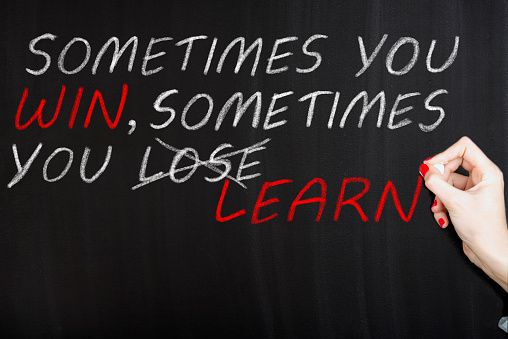Are you encouraging a growth mindset?

Several years ago, a Chinese student (let’s call him G) was assigned to me for daily one-to-one English and IELTS exam preparation classes for six months. He came from a well-to-do family and his parents wanted him to get into a British university as they believed that would secure his future. To do so, he needed a certain IELTS score that he strongly felt there was no way he would get.
He had spent a year in the UK by this point, attending General English classes and hanging out with other Chinese students, convinced that he wasn’t going to improve his English whatever he did, so why bother.
As I got to know him and dug deeper into his lack of motivation, he revealed that his mother was arranging for someone else to take the exam on his behalf as she too was convinced that he wasn’t going to get the needed IELTS score. (Please note that this is fraud and those caught doing so may be liable to legal action.)
G explained, “I’m not the studying type. My mum has always said that.”
I asked G how he was going to function when he gets into university and is unable to understand what is being said by both his teachers and his fellow classmates. G simply shrugged his shoulders and said, “I just have to get into a British university. That’ll secure my future and get me a good job. I don’t need to actually graduate. I won’t be able to anyway. I’m not the studying type.”
G and his mother were victims of a fixed mindset. One that believed that you were either born smart or stupid. You were either the studying type, or not. And if you were the latter, then you might as well not bother.
When I spoke to G about making an effort and trying hard to get the results he wanted, and how satisfying that would be when he sees his English improving, G said “It’ll be too hard for me because I’m not smart.”
It is no surprise that this self-fulfilling prophecy has plagued most of G’s school life: G believes that if he’s smart, he wouldn’t be struggling with his school work, and the fact he’s struggling must mean he’s not the studying type. G (and his mother) concludes that there’s no point in making an effort. This results in G getting bad results at school, reinforcing the belief that studying is just not his thing.
And this does not just stop at academic achievements. A fixed mindset like G’s is also likely to hinder his working life. Setbacks, failures, and anything that takes effort are undesirable, and seen as warning signs that one is not cut out for the job at hand.
But what is the alternative to a fixed mindset?

In 2006, Carol Dweck published her book ‘Mindset: How to fulfill your potential’, encouraging people to see setbacks and challenges as a learning opportunity, to believe that effort and hard work can help us learn just about anything, to understand that our abilities are not fixed and the process of learning can help our brain make new and stronger connections.
Dweck calls this a growth mindset and outlines her research showing that students with such a growth mindset engaged with their mistakes and looked to stretch themselves and ‘become smarter’. Meanwhile, those with a fixed mindset saw mistakes as a tell-tale sign that they weren’t smart, and they tended to stagnate, placing all their focus on the end score, the final grade, and/or the judgment on their ability.
So how can we encourage a growth mindset in our students? Here are some questions that could help remind us of the mindset that we are fostering:
How do you address the learning process?
Do you talk to your students about how the brain works, and the fact that the brain is a muscle that has elasticity and can change as you learn? Doing things that are challenging can help brain cells to multiply and get stronger.
Scientists have found that the difficult task of learning a foreign language can increase the size of the brain’s hippocampus and have multiple benefits such as increased intelligence, better perception and planning skills, etc. Other scientists have found that stretching the brain by learning a second language can help prevent Alzheimer’s disease.
It is perhaps important to highlight to our students that learning a foreign language can be extremely challenging and that it’s good to struggle when trying to communicate in the foreign language. It’s through lots of practice and hard work that one becomes fluent, even for those who appear to be linguistically talented.
How do you give negative feedback?
Carol Dweck begins her TEDx talk by talking about a high school in Chicago who gave students who didn’t pass the course the grade ‘Not yet’. The grade ‘Not yet’ highlights to the students that they are on a learning curve and offers them a path into the future.
Do the grades that you give come across as a final judgment of the student’s ability? Does your feedback on their tasks address their ability as static or does it offer constructive advice for improvement?

How do you praise?
In his TEDx talk, Eduardo Briceno looked at two groups of students who were given two different types of praises for completing a puzzle.
One was given a ‘fixed mindset praise’ – “That’s a really good score, you must be really smart at this!”
The other group was given a ‘growth mindset praise’ – “That’s a really good score, you must have tried really hard at this."
Both groups were then offered to do either an easier puzzle or a difficult puzzle next. The fixed-mindset-praised kids chose to do the easier problems next, but those who received the growth mindset praise chose harder puzzles to challenge themselves.
Does your praise encourage more learning? Or does it encourage students to stay within their comfort zones so as to get more praise?
Do you give personal praises like “You’re so smart!” or does your praise take into account the effort they have made, how hard they have tried, and the process they have been through?
How do you address the strategies that students use when approaching tasks?
It is not only the innate ability of the individual that leads one to success. It is also the strategy that is applied. Exam preparation teachers are extremely familiar with the exam strategies that can help students understand what examiners are looking for, how to approach a text, how to deal with trick questions, how to pace yourself, etc.
But in a regular English class, do we go through the strategies our students employ in their classroom tasks? Do we talk about learning strategies with our students and give them tips and ideas on how to learn in a way that suits their interests and their strengths and weaknesses?
How do you encourage students to see the success of others?
Do your students look upon more fluent classmates as competition? Do the more successful students seem intimidating to those who are struggling with their tasks?
The teacher often has the ability to set the tone in the classroom and to create a conducive atmosphere where teamwork and mutual co-operation is praised and encouraged. Learning is not a zero-sum game and the success of other students should serve to inspire and encourage fellow students and not spark feelings of jealousy.
Do you talk to students about growth mindsets?
Help students to develop a growth mindset by explicitly discussing this in the classroom. Help them see the difference between a fixed mindset and a growth mindset. (The infographic in this blogpost by James Taylor provides a clear description and can be easily adapted for classroom use.)

So what happened to my one-to-one student G?
After many conversations about how satisfying it would be to enjoy the fruits of one’s own labour, G was finally persuaded to give the exam (and language learning) a proper shot. It took him a while to convince his mother that he was capable of doing the exam himself, and after six months of intense English lessons and a lot of effort and hard work, he managed to get the score he needed to get into university.
I will never forget the moment when G proudly announced to me that he had got the score he wanted. Beaming from ear to ear, he said, “I did it all by myself and it feels good. I can study after all.’
We can be capable of so much more, as long as we believe we can.
Bibliography
Dweck, C. (2006) Mindset: How You Can Fulfil Your Potential, Robinson.



Comments
Write a Comment
Comment Submitted